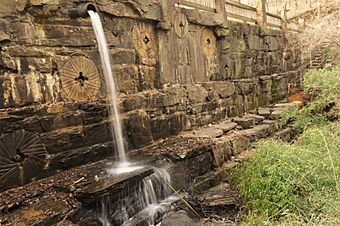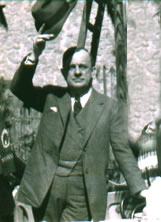Chinqua Penn Plantation facts for kids
Quick facts for kids |
|
|
Chinqua-Penn Plantation
|
|
 |
|
| Location | NC 1998 N side, 0.2 miles W of jct. with NC 1987, near Reidsville, North Carolina |
|---|---|
| Area | 22.8 acres (9.2 ha) |
| Built | 1923 |
| Architect | Ingalls, Harry C.; Et al. |
| Architectural style | Eclectic |
| NRHP reference No. | 93000235 |
| Added to NRHP | April 8, 1993 |
The Chinqua Penn Plantation is a beautiful English-style manor home located in Reidsville, North Carolina. It's in Rockingham County, North Carolina, about 25 miles north of Greensboro. This large home was built in the 1920s by Thomas Jefferson Penn, known as "Jeff," and his wife, Margaret Beatrice Shoellkopf Penn, known as "Betsy." The name "Chinqua Penn" comes from the chinquapin, a type of American chestnut tree that used to grow a lot in this area.
Chinqua Penn Plantation is considered one of North Carolina's best-preserved homes from the early 1900s. It's similar to other famous homes like Reynolda House and Duke Mansion. The plantation became a private home again and stopped offering public tours in 2012.
History of Chinqua Penn Plantation
Jeff Penn inherited some family tobacco businesses. He and Betsy moved from Virginia to North Carolina. Jeff also became very successful by investing in stocks and bonds, even during the Great Depression, a time when many people faced financial hardship. He also raised dairy cows, specifically Holstein cattle, and later, Black Angus cattle.
The Penn Tobacco Company was bought by the American Tobacco Company in 1911. This large company, owned by the Duke family, made famous cigarettes like Lucky Strike. Inside the Chinqua Penn home, you can see family symbols, called coats-of-arms. These show the Penn family crest and the crest of the Spencer family, who were related to the Penns.
Betsy Penn's father, Arthur Schoellkopf, was an important businessman. He was the chairman of the board for the Niagara Falls Power Company and also the Mayor of Niagara Falls, New York. Betsy lived almost 20 years longer than Jeff. During this time, she became very active in helping the community and giving to good causes. She even created the Betsy-Jeff Penn 4-H Educational Center on part of the estate. Most of the furniture and art in the house, which came from 30 different countries, were collected by the Penns themselves.
Changes in Ownership
In 1965, the house, its buildings, and all the furnishings were given to the University of North Carolina System to be cared for. However, it was very expensive to maintain. Because of the high costs, N.C. State University eventually stopped offering tours of the site.
Years later, in 2006, a businessman named Calvin Phelps bought the estate. He initially planned to build a copy of the home somewhere else. However, he decided to keep Chinqua Penn as a second home and open it as a place for tourists to visit.
Due to financial difficulties related to his tobacco company, the property faced challenges. In September 2010, the property and its assets were taken over as part of a legal process. In September 2011, a trustee took charge, and it was decided that all the items inside the house would be sold at an auction.
The auction happened in April 2012 at the Greensboro Coliseum Complex in Greensboro, North Carolina. It was a two-day event that raised about $3.4 million. After the auction, some items were expected to be displayed at the Museum and Archives of Rockingham County.
In September 2013, Chinqua Penn was sold again. SunTrust Bank bought the property from Phelps. Later, it was sold to a private buyer for $1.4 million.
The house and gardens were once open for tours, with the last tours taking place in March 2012. Today, the farmland next to the property is still used by North Carolina State University as a place for agricultural experiments.
See also
 | Janet Taylor Pickett |
 | Synthia Saint James |
 | Howardena Pindell |
 | Faith Ringgold |




